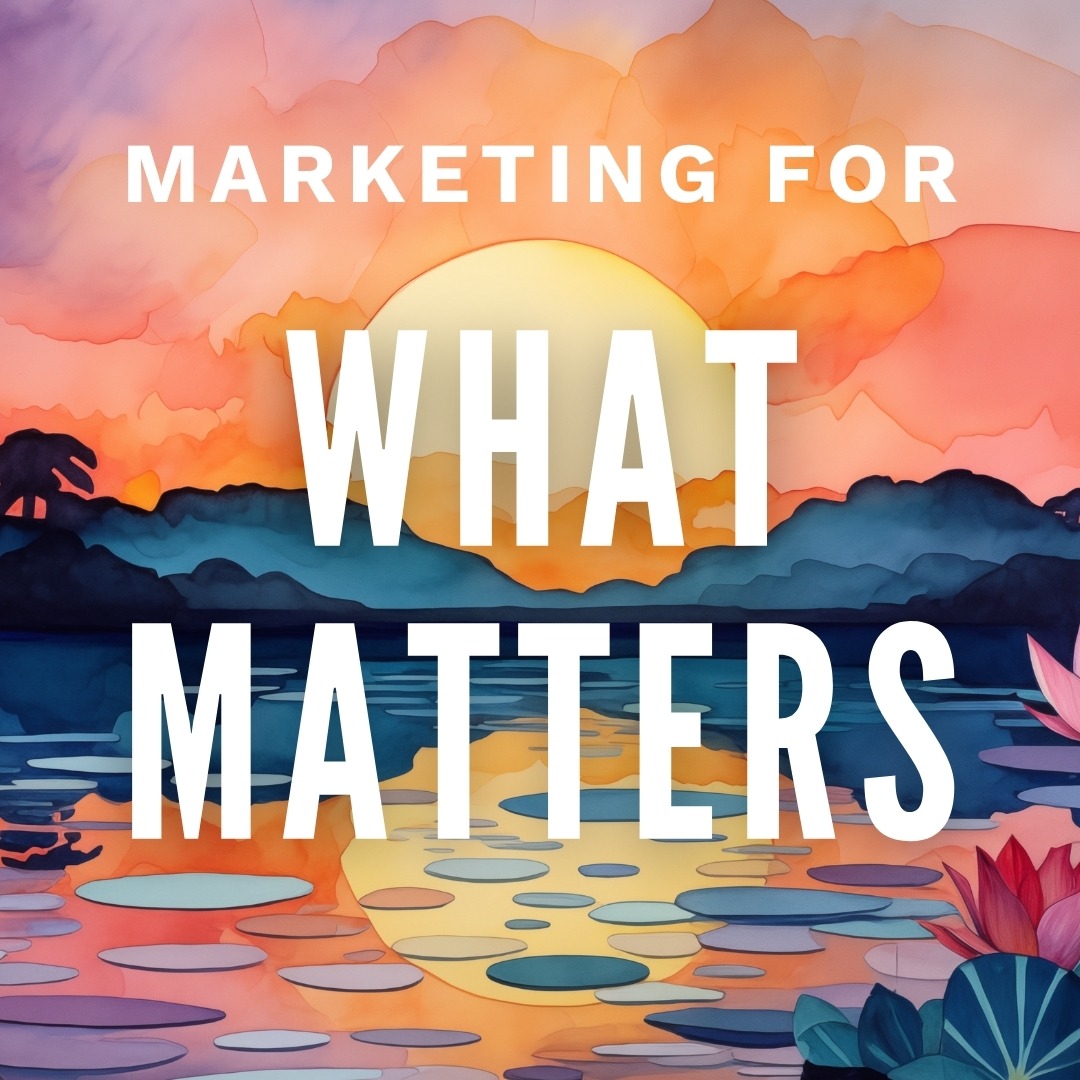Episode Summary
In this episode of Marketing for What Matters, Bo-Peter interviews Dan Moussa from Talesca, who shares his insights on the intersection of sustainability, recruitment, and corporate responsibility. They discuss how top tech companies are shifting their focus towards sustainability to attract top talent, the importance of genuine sustainability efforts to retain employees, and the impact of new regulations on businesses, especially SMEs.
Key Takeaways
- Recruitment Driving Sustainability: Top talent in tech industries is increasingly drawn to companies with robust sustainability strategies.
- Consumer Behavior Influencing Business: Consumer demand for sustainable products is pushing companies to adopt more eco-friendly practices.
- Genuine Sustainability Efforts: Companies must ensure they are not greenwashing, as failing to deliver on sustainability promises can lead to high employee attrition.
- Impact of Regulations: New sustainability reporting requirements are particularly challenging for SMEs, which need to prepare to comply.
- Global Differences in Sustainability Progress: Different regions are at varying stages of implementing and benefiting from sustainability regulations.
- Personal Commitment to Sustainability: Recruiters and professionals in the sustainability sector should embody the values they promote.
Action Items
- Subscribe: Subscribe to “Marketing for What Matters” for more episodes on sustainability and marketing.
- Connect with Dan Moussa: Follow Dan Moussa on LinkedIn or visit his website at talesca.com.au for more information.
- Check Out Dan’s Podcast: Listen to Dan’s podcast with Talesca at Talesca Podcast.
- Engage with Us: If you have feedback, suggestions, or want to recommend a guest, email us at [email protected].
- Support Sustainability: Learn more about One Tree Planted and consider how you can contribute to environmental efforts in your community.
- Share the Podcast: Help spread the word about “Marketing for What Matters” by sharing this episode with friends and colleagues.
View Transcript
Bo-Peter @ Peaceful Media (00:00.704)
So Dan, I just want to pick up on two things you just mentioned. You mentioned Microsoft and you mentioned reputational risk. And I’ve been told by other experts who I’ve interviewed that recruitment is one of the biggest things driving some of these bigger tech companies to start making changes around sustainability and actually investing into this because they want to attract more of that top tile. And especially in fields like data centers and AI, et cetera, that the people who are these experts, they have…
Basically, they can pick anybody. So it really makes a big difference in telling an employer story. Is that what you’ve been seeing as well in terms of the crossover and recruitment and sort of driving more ESG? What other factors come into play?
Dan (00:44.439)
Yeah, I think people by nature are becoming much more decision conscious, right? And much more aware of their decisions and how that affects their everyday life in terms of the legacy they’re leaving behind for their children, right? A big example of that is in Australia, which has got huge minerals and mining community. I’ve had a number of conversations with…
senior candidates say, hey, I want to get out of this sector and do something more purpose driven because my kids are coming home from school and they’re learning about sustainability and their planet and they’re asking what I’m doing and how it’s affecting the planet. So I think having a robust sustainability strategy and a plan of where you want to go is definitely going to be key to attracting talent in the future. Absolutely.
That’s like anything, right? If you produce something, a product or a material, consumer choice is gonna drive your sales going to the future, right? If people are gonna say, hey, this item of clothing you produced or this product, how was it produced? Where does it come from? How did they make it, right? So consumer behavior is gonna start driving sustainability, I think, more and more. But absolutely, when it comes to attractive talent, people are gonna be asking, well, cool, are you guys purpose -driven?
Are you value driven? What have you achieved so far and what are your plans to improve? So if you have that in place, you’ll open the door definitely to more talent. The biggest thing and that comes back to that risk piece and I want to make it absolutely clear. I’m not by any means an expert in greenwashing and climate risk. I don’t portray to be, but I think if you’re going to make these statements and put to people that this is what you do, just be make sure you’re doing exactly what you say.
Don’t sell the sustainability dream to attract talent and then not delivering it because you’ll find your talent leaving you pretty quickly and you’ll have a high attrition and you’ll have people walking to the door faster than they’re coming in.
Bo-Peter @ Peaceful Media (02:57.504)
Yeah, I can only imagine. Is this something that you see companies doing and struggling with? Is that they are doing that promotion and that they’re losing and then having that attrition when it comes to their talent?
Dan (03:08.727)
No, I don’t think we’re seeing it in terms of organizations that do it well and are generally pushing forward in sustainability and have a strong strategy and are actually making an impact or attracting more people. What I am seeing is that organizations that don’t are losing people. And they’re losing, particularly in the sustainability world at the moment is, I think we’ve come to this juncture probably more so in Australia where, cool, like.
the reporting side of it with the manager reporting coming in is on the whole moving towards the finance slash risk departments where it probably should be because it’s annual reporting that ties in there. So that kind of means that actually sustainability professionals now have a clear role to go and implement sustainable projects, make an impact and start changing the business. And so organizations are quite exposed, right, because they’re like, well,
Bo-Peter @ Peaceful Media (03:51.94)
Mm -hmm.
Dan (04:07.543)
Hey, this is taking COVID by reporting now and actually we’re not that committed to sustainability. You’ve got a lot of people like, well, I can’t make an impact. This company isn’t allowing me to make an impact. I want to go somewhere else where I can. So we are seeing a lot of movement in terms of sustainability leaders and professionals. If we’re not able to make an impact or the values are aligned to organization, they’re more than happy to stand up and walk out and make a change.
Bo-Peter @ Peaceful Media (04:35.412)
I think when I spoke to you last, you mentioned these regulations as well. How do you think this is going to make the biggest impact? Is it simply on the things like recruiting and being laid out like that? Or how else is this going to have an impact on the future of sustainability and getting these corporates to do what they’re going to say they’re going to do and change their ways?
Dan (05:00.695)
I personally think it’s going to have a major impact. You can’t move away from it. So I think by bringing in regulation and reporting, then people have to do it. They have to make some change. I think it will definitely force some good. I think actually the biggest impact it will have is probably globally, well certainly in Australia, on that SME market, right? Because…
But everyone’s who are probably most underprepared and most effective and going to have to make the biggest change, right? If you consider that, you know, a lot of your, and I’ll talk Australia, right? Your ASX 100, right? Your top 100 companies are prepared for this in terms of climate reporting and emission reporting and modern slavery. Because they’ve been doing it already and they know it’s coming and they’re pretty well prepared and a lot of them are getting on top of it, right? But.
who’s not prepared, I mean all the SMEs who are going to get a knock on the door in six months or in 12 months time who’s going to say, hey listen, you’ve been supplying as a product or service for the last 20, 30, 10, five years, wherever it may be, we’ve got to manage your report now, so I need your climate data on your emissions and your modern slavery and your supply chain. And they’re going to be like, pardon? What’s this? And if you can’t give it to us then you probably can’t be on our supply chain anymore, so.
Bo-Peter @ Peaceful Media (06:16.032)
Thank you.
Yeah. Right.
Dan (06:25.335)
We’ll have to move you off and bring in a partner who’s more aligned. So I think that’s the biggest effect that the manager reporting side is going to have. And I think there’s probably a real lack of education, understanding of what’s coming towards those SME type organizations who need to get ahead of us pretty soon. Otherwise, we’re going to be in for a bit of a shock, I think. So I think that’s potentially one of the biggest impacts we’ll see.
Bo-Peter @ Peaceful Media (06:53.248)
Yeah, and that’s going to be quite a startling impact for a lot of these companies, just like you said, just like the parted. And of course, the person’s problem is another business opportunity, I’m sure.
Dan (07:00.055)
Yeah, but…
Dan (07:04.599)
Yeah, but you know, time will tell, right? Like the European markets are already pretty far ahead of reporting and on the back of the reporting, you see more and more legislation in European countries, right? Asia’s getting there, Australia’s got a bit of catching up to do and, you know, all going well, the first cohort of manager reporting is going to come out coming in the first of the first of Jan 25, first Jan 25 for that first cohort of the large organizations.
you know, again, I’m not an expert in what’s happening in America, but there’s been various appeals, right, and climate report installing at the minute, and there’s a lot of challenge to it. So it’s kind of, it’s not moving there, right? So different parts of the world are moving at different rates, and we’re seeing different impacts, and what’s coming for back of it. But again, companies need to collaborate, and different parts of the world need to collaborate regionally and say, hey, listen, we’ve been running regulation here, and this is what we’ve seen, and this has been the positive.
the positive outcomes of it or over negative outcomes as it may be some as well.
Bo-Peter @ Peaceful Media (08:06.048)
Well, yeah, I’m no expert on this and this is definitely a topic I’m gonna have to do some more research in because I think there’s a lot a lot more going on there and I really appreciate you being able to highlight the different aspects that are around the world here and how that’s gonna hopefully take place or what might happen Ask one more question. Yeah, just one more question for you on the recruitment front you if a recruiter is listening to this
Dan (08:25.431)
No problem.
Bo-Peter @ Peaceful Media (08:33.632)
and they want to use their skills to make that positive impact on the world, especially in the sustainability sector. What advice would you give them to get going here or to take that next step?
Dan (08:45.175)
You need to learn the market. I think, you know, don’t disrespect sustainability professionals by pretending you understand the market and what they do if you don’t, if that makes sense. Probably a quick way to brush up people the wrong way, right? You know, I don’t pretend to be an expert by any state of play, but, you know, I do have an understanding that…
of what people do and industries they work in. And I didn’t learn that overnight. So I think if you’re going to go and get involved in the space, don’t sort of half arse it. Embed yourself in the space. Make sure that actually you want to be a part of this movement yourself. I’ve made changes in my own life, right? We now compost at home. We drive an electric vehicle. We recycle. I’m teaching the kids stuff because it’s a path I’ve chosen to take myself. So don’t just be like…
I want to recruit sustainability, but actually outside of working hours, I don’t really care about it, right? I think it’s something you’ve got to invest in personally. You’ve got to learn and throw yourself into the industry and then really try and become, you know, a knowledgeable individual so you can provide maximum value to candidates and clients. Because if you’re not knowledgeable about your sector, then how can you add that max value to candidate and client?
Bo-Peter @ Peaceful Media (10:07.904)
Absolutely. So are there any books, documentaries, courses, thought leaders in the space that have really inspired you and that you’d pass along to anyone who’s interested in this?
Dan (10:17.051)
Fault leaders, there’s many. I think again, like it depends, you know, if you want to follow people on circularity or sustainability strategy or reporting, there’s different areas. In terms of courses, you know, Cambridge Institute of Sustainable Leadership has some fantastic courses. Your local, you know, the United Nations has international.
and global compact networks for it for each country and certainly the Australian UNGC, UNGCN sorry it has some fantastic courses that are coming out all the time. Yeah, again I’m lucky I podcast that’s been my way I’ve just been able to have some amazing conversations with some awesome people and I think I’m always cautious about thought leaders you know I think just be a thought sharer.
You know, thought leading is ultimately thought sharing, right? People just call them thought leaders because they had the thought first. Just get out and speak to people. Embrace the subject, learn, be open minded, be inquisitive, and to guess just be be prep is driven at the end of the day, ultimately. But yeah, maybe I’ll come back to you and send you a few people you can put in the blog to go and share. But you know, the likes of Susan Masrachi in Australia from
Bo-Peter @ Peaceful Media (11:13.696)
Yeah.
Dan (11:41.911)
from a modern slavery point of view is outstanding. Justin Frank down here has been involved for a long time. If you go on my podcast, the Engaging ESG and Sustainability podcast, just did a great episode of Luke Keelbooth who’s the CEO of BWD Strategic. There’s a number of people on there, right? Just doing great things.
Bo-Peter @ Peaceful Media (12:01.824)
Yeah, so then it’s a great resource right there, the Engaging ESG Podcast. That’s the place to go. And thanks. I’ll get some of these resources, certainly, in the show notes for people to follow up on.
Dan (12:15.063)
Perfect.
Bo-Peter @ Peaceful Media (12:16.352)
Awesome. So Dan, as you know, here at Marketing for Our Matters, we want to put our money where our mouth is, at least a little bit, while we go on this journey. And so as part of that, we want to plant trees on your behalf with our partnership with One Tree Planted. So I’m just going to share my screen briefly. And when we…
getting ready for this call, you told me that you were interested in planting trees in biodiversity. You just tell the audience briefly, you know, what makes you interested in planting trees in an effort to support biodiversity.
Dan (12:56.311)
Yeah, I think I’m always I’m always reasonably like, I guess cautious about planting trees, but like these guys, I think are fully verified, right? And I think biodiversity is a biodiversity loss is one of the biggest challenges I think we face as humanity for for a number of reasons. Simply put, you know, like everyone hated the COVID, the COVID era and inferior like a loss of biodiversity means it was obviously much more.
cross -contamination between humans and vermin, for example, right? So you’re gonna lead to greater pandemics. But alongside that, you know, the loss of biodiversity has probably one of the greatest impacts on climate as well. One of the most aggressive impacts on climate too. So that’s why I’ve chosen biodiversity today because we’re losing it at a rate of knots and really need to be stopping that and trying to get back.
Bo-Peter @ Peaceful Media (13:51.744)
Well Dan, thank you so much for taking the time with us today. I really appreciate the perspective that you’ve given us and I hope that the audience will certainly find this valuable. I know that I have found this a very valuable conversation. Any last words that you want to share with us, where people can find you, any projects that you’re working on, feel free, this is your moment to share.
Dan (14:11.447)
Yeah, it’s been awesome mate. Thanks very much. Just more than happy. I’m by no means a sustainability expert, but just certainly passionate and passionate and trying to add some value when I can. So thanks very much for having me on. And if anyone sort of wants to talk about anything we discussed today and in the recruitment space, the sustainability space, and find me on LinkedIn and pop me a message and more than happy to do so.
Bo-Peter @ Peaceful Media (14:35.36)
Well, we’ll definitely be putting your LinkedIn and the website and the show notes so people can find you. And we’ll be sharing some of the content from this podcast on LinkedIn as well. So we’ll make sure that they can get connected with you. All right, Dan, thanks so much again today. And I appreciate so much your time and energy today. Awesome.
Dan (14:48.535)
Legend.
Dan (14:53.239)
Pleasure, thanks very much. Cheers mate.



